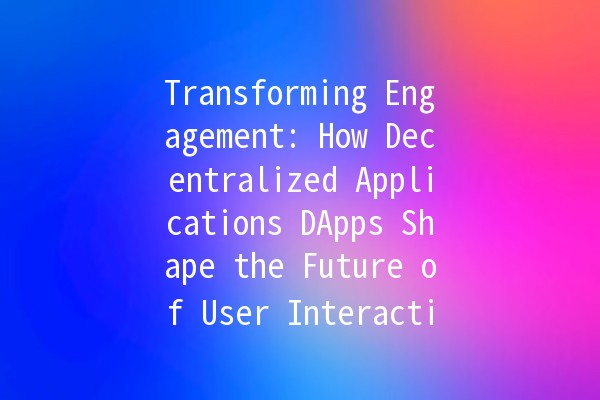
Decentralized Applications (DApps) have emerged as a revolutionary force in the digital landscape, reshaping the way users interact with online platforms. Built on blockchain technology, these applications offer unique solving methods for traditional problems such as centralization, security, and transparency. In this article, we'll delve into practical strategies to leverage DApps effectively, enriching user experience and enhancing productivity in this new digital frontier.
Understanding DApps

DApps are applications that run on decentralized networks, primarily supported by blockchain technology. Unlike traditional applications, which rely on centralized servers and databases, DApps utilize a distributed ledger, allowing for greater transparency, improved security, and enhanced user empowerment. The key characteristics of DApps include:
The growing popularity of DApps can be attributed to their ability to provide a trustless environment, where users can interact without relying on intermediaries.
Five Essential Tips for Enhancing Productivity with DApps
Embracing DApps can significantly boost productivity. Here are five effective strategies for leveraging their potential:
Description: Smart contracts are selfexecuting contracts with the terms of the agreement directly written into code. They automatically enforce and execute contractual agreements, reducing the need for intermediaries.
Application Example: In a business setting, companies can use smart contracts to manage supply chain processes. For instance, when goods are delivered, the smart contract can automatically release payment, minimizing delays and reducing administrative overhead.
Description: DApps provide an immutable record of transactions, allowing parties to access transparent data. This has implications across various industries, including finance, healthcare, and governance.
Application Example: A healthcare provider might use a DApp to maintain patient records securely. Each transaction related to patient treatment is recorded on the blockchain, ensuring that only authorized personnel have access while also enabling patients to view their records.
Description: Many DApps incorporate tokenbased reward systems that encourage user participation and engagement. By rewarding users for specific behaviors, DApps foster a more vibrant ecosystem.
Application Example: A social media DApp could reward users with tokens for creating quality content or engaging with others. These tokens might be exchangeable for premium features or services, incentivizing users to remain active on the platform.
Description: DApps inherently support peertopeer transactions, eliminating the need for intermediaries and reducing transaction costs. This is particularly advantageous in sectors where trust and direct interactions are key.
Application Example: An online marketplace DApp allows users to buy and sell goods directly from one another using cryptocurrency. This approach not only reduces fees associated with traditional payment methods but also enhances security since transactions occur on the blockchain.
Description: The opensource nature of many DApps encourages community involvement in development and decisionmaking. This fosters transparency and builds a sense of ownership among users.
Application Example: A DApp aimed at environmental sustainability could allow community members to propose and vote on initiatives. By engaging users in the development process, the DApp not only enhances its value but also aligns itself closely with the community's needs.
Common Questions About DApps
DApps offer enhanced security, user empowerment, and lower costs. By eliminating intermediaries, DApps can reduce fees while offering greater transparency through blockchain technology.
Businesses can streamline operations through smart contracts, improve data security, and foster customer loyalty with token reward systems. DApps allow businesses to operate more efficiently while building trust with customers.
While some DApps may require technical knowledge, many developers are working towards creating userfriendly interfaces. As the ecosystem evolves, ease of use is expected to improve significantly.
Yes, DApps can facilitate ecommerce by providing secure transaction systems and peertopeer interactions. They can help businesses reduce operational costs and enhance customer trust.
While DApps are generally more secure due to decentralization, vulnerabilities in smart contract code or network attacks can pose risks. It's vital for developers to conduct thorough audits and testing.
DApps create an immutable record of transactions, allowing users to track activities on the network. This transparency fosters trust and accountability among all parties involved.
DApps represent a transformative shift in how we interact with technology, highlighting the immense potential of blockchain to disrupt traditional processes. By leveraging smart contracts, embracing transparency, incentivizing engagement, facilitating peertopeer transactions, and fostering communitydriven development, users and businesses can significantly enhance productivity. The future is decentralized, and DApps are at the forefront of that revolution.
Embrace the change, explore the possibilities, and unlock the potential of decentralized applications for a more engaged, efficient, and transparent digital world.

